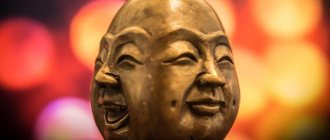Temperament: 4 types of human temperament
A person’s temperament can be called a kind of biological foundation on the basis of which the personality itself is formed. These are social properties of the psyche that determine the dynamics of mental activity, behavior and social adaptation of people.
Hippocrates is considered to be the founder of the doctrine of types of temperament. He argued that people are divided depending on the ratio of the four main substances of the body: black bile, yellow bile, phlegm and blood. Claudius Galen supported the idea of Hippocrates and wrote an entire scientific treatise called “Right Measure”. Claudius Galen identified four main types of human temperament. These are sanguine (blood), choleric (bile), phlegmatic (phlegm), melancholic (black bile).
Take a temperament and extroversion/introversion test.
What is temperament
Temperament is based on the type of higher nervous system. People (like animals) differ from each other from birth:
- by the strength of the processes of excitation and inhibition;
- the balance of these processes;
- mobility (changeability) of excitation and inhibition processes.
Taken together, this determines the endurance of nerve cells, that is, the endurance of the psyche.
Discovery of temperament
When excitation predominates over inhibition, conditioned reflexes are formed quickly and slowly subside, and when the ratio is reversed, conditioned reflexes are formed slowly and quickly fade away. These patterns were discovered by the domestic scientist Ivan Petrovich Pavlov.
This discovery made an invaluable contribution to the further development of psychology and pedagogy. Currently, there is no doubt that each person requires an individual approach in the process of upbringing, training or psychological correction.
Temperament and personality
Temperament is a set of innate mental properties. It serves as the basis for character formation. This is what is biological in a person.
At the same time, temperament is involved in the formation of personality. As a set of individual characteristics, it influences the dynamics and emotional side of human activity and behavior.
Depends on temperament:
- speed of occurrence of mental activity;
- stability of mental processes;
- mental tempo and rhythm;
- intensity of mental processes;
- direction of mental activity.
Anxiety, impulsiveness, emotionality, impressionability and other personality traits depend on temperament.
Temperament and character
Temperament is often confused with character. I propose to put an end to the differentiation of these issues once and for all.
- If character is a product of socialization, then temperament is an innate, unchangeable feature of an individual.
- You cannot change your temperament, but you can learn to manage it. Character can be changed.
- Temperamental traits can be masked by personality traits, making it difficult to determine what type of temperament a particular person belongs to.
Temperament and activity
Temperament provides an individual style of activity, that is, work methods characteristic of a particular person. So, for example, one child, when solving a problem, can sit idle for a long time, think about it and immediately write down the result, while another will immediately start writing something down, sketching it out, crossing it out, and after a while will isolate the main thing from it. Same result - different ways to achieve it.
Properties of temperament in psychology
Human temperament is based on a number of specific properties, such as:
Sensitivity. This is the degree of force of external influence necessary for a reaction to occur on the part of the psyche. Some people react calmly to external stimuli, others react violently;
Reactivity. The property of reactivity is determined by the level of involuntary reaction to internal or external influence (sharp sound, tone of voice);
Activity, the ratio of activity and reactivity. These properties indicate how a person reacts to life's difficulties. Is he ready to overcome various obstacles in life, to be focused, persistent, attentive;
Rigidity and plasticity. These properties of temperament can indicate how skillfully a person can adapt to external influences of the social environment;
Rate of reactive activity . They characterize the speed of mental processes and reactions to external stimuli;
Introversion and extroversion. These properties depend on the speed of human reactions and the speed of solutions applied;
Emotional excitability . Characterizes the degree of external influence on a person in the form of manifestations of signs of emotional arousal;
Unpreparedness for a serious relationship
Noisy, cheerful, easy-going, erudite sanguine people naturally attract the attention of the opposite sex. But they themselves are in no hurry to build a long-term relationship with a partner, reorient themselves to family life, solving life’s difficulties and raising children.
No diapers or socks scattered around the apartment! Only flirting, candlelit dinners, kisses under the moon and parties, parties...
In a marriage with a sanguine person, you will deal with bills, homework and laundry yourself. This is partly offset by its bottomless source of fun.
Just remember Bill Clinton. The image of the president playing the saxophone during moments of alien invasion and other similar apocalyptic processes was actively used in American cinema. But he is also sanguine...
Choleric - characteristics of temperament: pros and cons
Cholerics have a strong-willed character.
Type of nervous system : unbalanced, unrestrained, overly mobile.
A choleric person takes on any difficult task, no matter how difficult it is. Such people are excellent speakers, they are eloquent and convincing in almost any dispute.
Choleric people are not vindictive, they quickly forget grievances and cannot hold within themselves for a long time a feeling of anger towards the offender.
Cholerics are excellent leaders; they can organize people and make difficult decisions for them. In a critical situation, a choleric person is able to group, repel the enemy, and protect a weak person.
The choleric person is not restrained in his statements in relation to current events, and can sometimes become rude.
Cholerics have a certain tendency to dominate other people. Often people with such temperaments are prone to rapid mood changes and excessive gesticulation.
In the love sphere, the choleric person is quite jealous, and for him the loved one becomes a kind of property. People with this type of temperament quickly fall in love and become attached to another person. Sometimes choleric people in relationships are prone to anger and scandals.
Choleric children are quite capricious and are often the center of attention in the family. A child can use his emotions to achieve the desired result. Such children are often capricious, show hyperactivity in adolescence, and may become interested in sports or music, but they quickly become bored with their hobbies.
Phlegmatic people
These individuals are distinguished by balance, strength and inertia. They are diligent, not particularly active, reserved, and moderately persistent. They manage to remain calm even in very difficult situations. They have the following qualities:
- The ability to adequately respond to what is happening in the outside world.
- Sociability combined with low communication skills.
- Inability to quickly make the right decisions.
- Slow formation of feelings. They arise gradually, but are distinguished by their depth and constancy.
- Patience.
- Susceptibility to affect.
- Poor facial expressions and gestures.
- The ability to restrain and control your emotions.
To summarize, phlegmatic people are slow people in every sense of the word and spheres of life. In everything they are characterized by measuredness and thoughtfulness.
Disadvantages of a choleric person
The main disadvantages of a choleric person include:
- Excessive haste in your actions and actions;
- Cholerics are not patient;
- Excessive impulsiveness and imbalance;
- Excessive straightforwardness and harshness when communicating with other people;
- Aggression that occurs periodically;
Psychologists recommend that choleric people learn to work on themselves. This work should include the ability to control oneself in any conflict situations. Often choleric people make rash decisions and literally throw themselves into the pool headlong. The ten-second tactic suits them, which consists of mentally counting to ten before making an important decision or expressing an opinion.
How to raise a choleric child - 10 tips
Choleric children are very difficult to raise, so parents will have to use wisdom, tolerance, and sometimes miracles of oratory:
- It is important to teach the little choleric person to keep his emotions under control and not to explode due to any failure. He needs to explain that shouting, tears and name-calling will not change the situation, and being nervous is harmful to health. You can teach your child to restrain himself using a simple rule: count to yourself to 10 before you throw your fists at a friend or decide to throw a tantrum in the supermarket.
- The inexhaustible energy of a choleric person must be directed in the right direction so that it does not come out of him in the form of fights, hysterics and violations of discipline in institutions. You can enroll your child in dancing, sports, or a pop song club.
- If parents notice that their child is overindulging, he needs to find something to do. Let it be feasible housework (give the cat food, wipe the dust, wash the cups). The child will be active and will be involved in housework. This will help him quickly become independent and responsible.
- Choleric children often lack good manners. You can teach them to your child by reading and discussing instructive books together.
- It is better to exclude from the environment anything that excites the child’s nervous system.
- Gently insist that the little cholera be assiduous and bring the job he starts, even the smallest one, to the end.
- Present household chores in the format of games or quests.
- A choleric child can infuriate his parents with his behavior, but one must not succumb to provocations. You need to communicate with your child respectfully and gently. Screaming from parents undermines the child's trust in adults.
- You shouldn’t spend hours convincing a choleric person of something or making deals with him. It is better to ask, tactfully, then firmly.
- Listening to the child’s words is very important for him.
Sanguine person - characteristics: pros and cons of sanguine person
Sanguine people are cheerful and incorrigible optimists. These people cannot sit still, they need constant movement.
Sanguine people are very active, and this activity manifests itself in literally all areas of a sanguine person’s life. They love to be the center of attention, but unlike choleric people, they do not have the habits of dictators.
The peculiarity of the psychological behavior of sanguine people is characterized by a high degree of excitability.
Sanguine people know how to get along with people and find a compromise in any difficult life situations. They are resourceful and enterprising. A sanguine person can literally lead a crowd, because these people are excellent speakers who know how to convince others that they are right.
Hyperactivity does not give a sanguine person the right to sit still. He tries to make his life brighter and more interesting. Such people love to travel, discovering more and more new facets of the world around them. Many artists, musicians, and actors are sanguine.
Cheerful disposition and carefree
Carlson, who lives on the roof, is another example of the dominance of sanguine temperament traits over other types. He arrived when he felt like it, destroyed the room, ate the whole cake and calmly flew away with a sense of accomplishment.
On the one hand, it's fun. This behavior is very relaxing and helps you take your mind off current problems and thoughts. But on the other hand, baby, stay to restore order and justify yourself to your elders. Sanguine has nothing to do with it. And in general there was no trace of him.
Psychological feature of a sanguine person
If we talk about the psychological component of sanguine people, then in these people the degree of excitement in the central nervous system is quite high. On the contrary, the inhibition threshold is low, and therefore sanguine people perceive the world in a somewhat illusory way. But at the same time, thinking and memory functions are remarkably developed. Often sanguine people focus their memory only on what arouses their interest. They can remember funny incidents, but at the same time forget the birthdays of their friends. Sanguine people pay attention to noticeable details, such as bright clothes or the unusual hairstyle of their interlocutor.
The emotional background of sanguine people is quite diverse. These people are emotional and are not afraid to show their experiences to others. They often gesture when talking, and may hug or kiss when meeting. These emotions are completely sincere; a sanguine person wants to please people and receive the same reaction from them in return. Sanguine people are distinguished by unconventional thinking; they are constantly trying to learn something new, change their image or type of activity. Monotonous work and loneliness lead them to severe depression.
People with this type of temperament have a lot of friends. A sanguine person knows how to make friends, and always comes to a person’s aid in a difficult situation. In personal relationships, sanguine people are sometimes flighty. An excessive thirst for communication prevents them from building a strong family.
I like this picture too much
Such words are in one of the songs of V. Tsoi, who, by the way, was also an artist.
There are many paintings on offer in special salons, for every taste. But they, like other interior details, should be chosen not only based on the popularity of the author, the plot and overall brightness. It is necessary for the picture to be “their own” in feeling. It happens that even the discreet work of a little-known artist can inspire, console, motivate, and give strength. And spectacular images of the best masters of art do not always resonate with the soul.
If among paintings with a certain plot you find it difficult to find something that is really close to you, you can pay attention to abstract art . One of the most minimalist and laconic works in art is “Black Square” by Malevich. Such works are good because they do not overload the mind and give freedom to the imagination. In my opinion, they can often make a greater impression than detailed, intricate paintings. It is important that the meaning of the image is clear and resonates with your inner world.
Perhaps there are few rules in choosing paintings.
The main thing is that the room is not overloaded with them, that their color scheme is in harmony with the room and does not irritate, and that the picture is close to you as if you painted it yourself !
There are only five paintings in my room. Initially, I had no goal of buying works of art for the walls, but after seeing each one separately, I couldn’t resist (I purchased them one by one).
One depicts a green valley in a silvery haze, the other shows a sakura branch, the third shows peonies, and the other two show night landscapes of Montreal and Venice. Each conveys the beauty of nature and cities, and, moreover, is laconic.
You admire these pictures not only with your eyes, but with your whole being. Looking at them, you are convinced that art really charges.
If something similar happens to you, most likely it is yours.
Here's what we can advise those who are still in doubt about what to start with when decorating a house, apartment or room. From my pre-minimalist experience, I know that you shouldn’t carry even very beautiful things into your home on impulse. There is too great a chance that they will remain just “ beautiful things”, but not yours.
And to prevent this from happening, listen to yourself more often, then it will be easier to understand what you really need.
If you find an error, please select a piece of text and press Ctrl+Enter.
We recommend viewing useful materials:
The main disadvantages of sanguine people:
- Inconsistency in actions and deeds. A sanguine person often gets down to business, but rarely completes it; such people cannot work in monotonous work;
- Sanguine people often overestimate themselves and their capabilities;
- People with a similar temperament have mood swings, it is difficult for them to develop strong-willed qualities;
Psychologists recommend that sanguine people work more on their willpower. Pay attention to little things, learn to rely on your own strengths.
Flexibility of mind
A sanguine person will not get hung up on one thought. He easily flits from one idea to another: here he plans to go on a cruise, now he plans to paint his nails with red polish or eat a chocolate bar.
Giphy
At the same time, an analysis of the situation rushes through the sanguine person’s head like a whirlwind. He is able to see it from different sides, and very quickly. This useful quality helps to avoid many mistakes in life.
Phlegmatic - characteristics: pros and cons
A phlegmatic person is a balanced person who carefully thinks through his every step. Usually such people have an analytical mind and look at life around them soberly.
Phlegmatic people are quite lazy, often prefer not to be active and go with the flow. They are always calm and unperturbed. Even if they have experienced stress or an unpleasant life situation, they do not always show their temper.
It is difficult to anger a phlegmatic person; his nervous system is like a scale keeping balance. If it is difficult to bring him to simple emotions, then making him show activity or joy is even more difficult.
In other words, the phlegmatic type of human temperament is recognized as the most balanced and emotionally stable.
Phlegmatic people do not immediately make contact with people; they need time to assess the situation. A sudden change in the environment is like a tragedy for them and it is very difficult to bear. These people do not like active entertainment, they like a cozy home environment, and often prefer to spend time alone with themselves.
Phlegmatic people are painstaking and diligent in their work, they have a good memory and can remember large amounts of information.
Phlegmatic people are rather closed and hidden; they are reluctant to show sympathy for another person. But if a phlegmatic person likes a representative of the opposite sex, then he will do everything to achieve his favor.
It is quite difficult to find friends with a phlegmatic person; he does not make contact well. But if a person with this type of temperament finds a friend, then this friendship can last a lifetime. For phlegmatic people, family is a kind of fortress in which they feel comfortable. Such people get married late and may spend a long time searching for a partner.
Alter ego is our echo
Based on individual properties, you need to be able to decorate a house or other room where you spend a lot of time.
Many people, when choosing colors or interior design, prefer to follow fashion or other factors. But, no matter how impressive and modern their apartment looks, it is not always possible to feel the comfort and “feeling of home”.
External attractiveness and style are, of course, important, but to truly connect with your home, you need to make it a part of yourself. In a sense, the house should become your alter ego (psychologists call this part of a particular personality invisible to others, which reflects its true desires or traits that are unusual for a person, but desirable for him).
There are three main options here: you can make your home your “mirror” , using your favorite color combinations and attributes that reflect your essence; or you can make it your “opposite” by adding what you personally lack.
combine all this : for example, the color of the walls can completely match your character, and the color of the furniture can compensate for missing features using the desired shade. Or vice versa.
According to my observations, in apartments you can often notice a mixture of everything possible and impossible, which means everything, but does not reveal the character of the inhabitants. It seems that the owners did not really understand either themselves or each other. The result is “emotional cacophony.”
Melancholic - characteristics: pros and cons of melancholic
Melancholic people are prone to attacks of despair and depression. The temperament of such people is sluggish and pessimistic. Any event, even a minor one, makes a melancholic person worry. He does not know how to enjoy life, and sees it exclusively in a negative tone. Sadness and melancholy can cover such a person for no reason; melancholic people often experience a feeling of self-pity.
People with this type of temperament have to resort to secrecy and suppression of emotions. They experience everything within themselves, which is why depressive mental states appear. Psychologists note that a huge number of people who commit suicide are melancholic.
A melancholic person reacts slowly to external stimuli, does not remember information well, and often suffers from a lot of complexes and an excessively low level of personal self-esteem. Motor activity is sluggish and inexpressive.
Melancholic people cannot work intensively and monotonously, as they necessarily need rest or short breaks to stabilize their psychological state. In a social environment, such people are lethargic, uncommunicative, and it is difficult for them to find a soul mate or a close friend. It is difficult for them to be active and cheerful. They choose sanguine or choleric people as people, since this choice is explained by the melancholic’s subconscious desire to be taken care of.
It can be difficult for melancholic people to arrange their personal life. Often a big role in the fiasco of love relationships is played by their indecision and cowardice. They choose a strong person as their life partner. There are also advantages to this type of temperament.
Melancholic people are kind, vulnerable, and will always share the last thing they have. They subconsciously want to help a person in need.
Briefly about the concept
First, some general information. Before talking about mixed and highly emotional types of temperament, it is necessary to explain what it depends on and how it is formed.
Well, a person has these characteristics from birth. They are of psychophysiological origin and therefore very stable. It is temperament that determines the dynamic characteristics of a person’s states and ongoing mental processes.
At the same time, this characteristic does not affect moral qualities and cognitive abilities in any way. However, temperament must be taken into account when choosing a field of activity. Thus, people with slow reactions will find it difficult to control some mechanisms at high speeds. But they will cope excellently with work that requires perseverance and concentration.
Disadvantages of melancholic people:
- Emotional instability, indecisiveness, lack of self-confidence and strength;
- Difficulty with the perception of the surrounding world, vulnerability, pessimism;
- Tendency to depressive mental states;
Psychologists strongly recommend that melancholic people not close themselves off. Try to explore the world, travel, communicate with new people. You can try mentoring to improve your personal self-esteem. Engage in active sports, dancing, any creativity. A melancholic person needs to be close to loved ones and friends, and not withdraw into himself and his feelings.
Read more: How to determine a person’s temperament by his behavior
Take a temperament and extroversion/introversion test
Source of pictures-tables: psi-school.ru
Article rating
Ease of communication
Based on your communication experience, you can draw a conclusion about the “weight” of the energy of your interlocutors, which can be heavy or light. The inherent ability of sanguine people to brush aside the negative moments in life and concentrate on the bright moments makes them surprisingly charming and easy to communicate with.
Endless whining, complaints, gossip - this is not about them. And if you yourself try to tell a sanguine person about the hardships of your own existence, he will proudly say something like “but we were the first in Space.”
How to survive if you are melancholic
As soon as you take a temperament test and see a disappointing result, panic begins in your head. The question arises: “what should I do if I’m melancholic?” Contrary to stereotypes, this is not the worst temperament. It is important for vulnerable individuals to learn stress resistance and apply this skill in everyday life.
Where to get energy or a short guide on how to become happy
- Minimize communication with toxic people who bring negativity into your life.
- Do not get carried away with caffeine and other nervous system stimulants.
- Spend more time in the fresh air, watch your sleep patterns and diet.
- Play sports.
- Plan your work schedule so that you have time for self-development and spiritual practices.
Don't rush to label yourself and come up with excuses. Remember that how others treat you will depend on how you present yourself.











